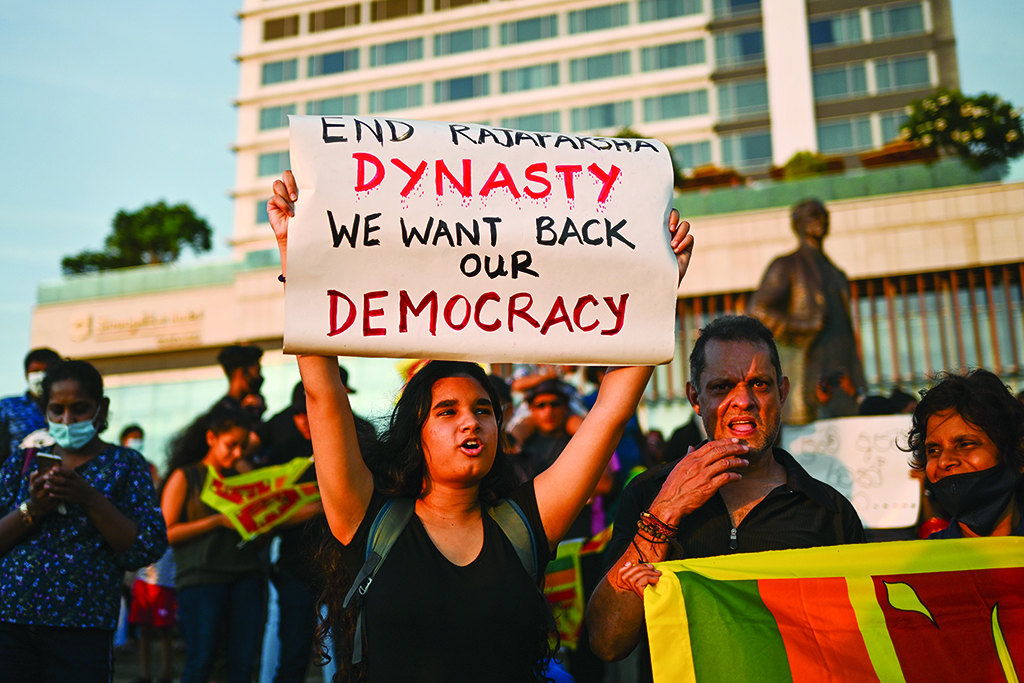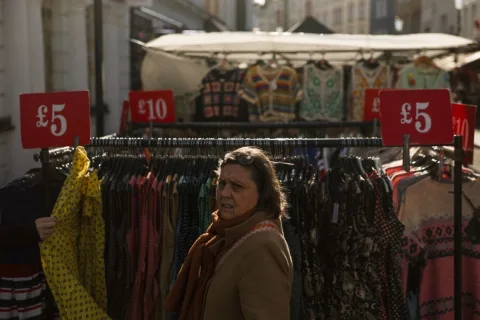COLOMBO: Sri Lanka on Saturday announced a five-day share trading halt after the crisis-hit country hiked interest rates and declared a default on its external debt during the traditional New Year holiday, as trade unions and top cricket stars joined protests demanding the president's resignation. The move came ahead of Colombo's planned talks with the International Monetary Fund in Washington on Monday to negotiate a bailout as the country has run out of foreign exchange to finance even the most essential imports. The island nation is grappling with its worst economic downturn since independence in 1948, with regular blackouts and acute shortages of food and fuel in addition to record inflation.
The crisis has caused widespread misery for Sri Lanka's 22 million people and led to weeks of anti-government protests. Several trade unions joined demonstrators laying siege to President Gotabaya Rajapaksa's seafront office for an eighth straight day Saturday demanding that he and his government quit, with thousands of health sector trade workers marching to the Galle Face promenade to join the protest. Colombo Stock Exchange officials said they were under pressure from brokers and investors not to reopen on Monday to prevent an anticipated collapse of the market.
The CSE said regulators had expressed concern over the "ability to conduct an orderly and fair market" and it would remain closed until Friday due to the "present situation in the country". The central bank almost doubled its benchmark interest rate to 14.5 percent following the close on April 8, the last trading day before the holiday. And in the face of an unprecedented forex crisis the government on Tuesday declared it was suspending interest and capital payments on its huge foreign debt. The CSE's All Share Index has shed over 38 percent in the past three months, while the Sri Lankan rupee has fallen by more than 35 percent against the US dollar in the past month.
'Loud and clear'
Sri Lanka's World Cup-winning cricket captain Arjuna Ranatunga and fellow ex-skipper Sanath Jayasuriya became the first high profile sports stars to join the demonstrators outside Rajapaksa's office. Cricket is avidly followed in the Indian Ocean island nation and the pair called on other former players to support peaceful protests. "Cricket is driven by spectators," Ranatunga said outside the colonial-era building in Colombo on Friday, surrounded by demonstrators, some of whom have been camping overnight since last week.
"Our fans are on the streets today because they no longer can bear the hardships. We must be with our fans when they need us most. Sports stars must physically join the protests." Hours later, his fellow former captain Sanath Jayasuriya, known as "Master Blaster", climbed the barricades in front of Rajapaksa's office and pledged solidarity. "Your message is loud and clear," he told the tens of thousands of protesters. "I hope the authorities will listen and ensure a brighter future for all of us."
Crowds have been chanting "Gota go home, go home Gota." Diplomatic sources said ambassadors have made it clear to top politicians that any use of violence against the peaceful protest could jeopardize the planned bailout talks with the IMF next week. Sri Lanka is to meet with IMF officials in Washington from Monday to negotiate a financial package to address the balance of payments crisis and the shortage of foreign reserves. Sri Lanka had sought debt relief from India and China, but both countries instead offered more credit lines to buy commodities from them.
Fuel rationing
Cash-strapped Sri Lanka imposed fuel rationing on Friday in another worsening of the economic crisis that has sparked widespread demonstrations calling for President Gotabaya Rajapaksa's resignation. The state-run Ceylon Petroleum Corporation (CPC), which accounts for two-thirds of the retail fuel market, said it would limit the quantities drivers can buy, and banned pumping into cans altogether to prevent motorists stocking up on petrol or diesel in fear of further rationing. The maximum for motorcycles was set at four liters of petrol, with three-wheelers allowed five liters, the CPC said. Private cars, vans and SUVs were allowed up to 19.5 liters of either petrol or diesel.
Most pumping stations were already out of petrol, while the few that remained open saw long queues. At least eight people have died while waiting in fuel lines since last month. Energy ministry officials said they expected the country's other fuel retailer, Lanka IOC-the local unit of Indian Oil Corporation-to follow suit. There was no immediate comment from the Lanka IOC, which accounts for the remaining one third of the market. The island nation is in the grip of its worst economic crisis since independence in 1948, with severe shortages of essential goods and regular blackouts causing widespread misery.
The country's main cooking gas retailer Litro Gas said it was completely out of stock, but hoped to get new supplies by Monday to resume distribution. The state-owned firm said its chairman, Theshara Jayasinghe, a strong ally of Rajapaksa, had resigned on Thursday over the "prevailing situation" in the country. Tens of thousands of people kept up a protest outside Rajapaksa's office for a seventh straight day Friday demanding he quit over the economic hardships suffered by the country's 22 million residents.
Sri Lanka's economic meltdown began after the coronavirus pandemic torpedoed vital revenue from tourism and remittances. The government has urged citizens abroad to donate foreign exchange to help pay for desperately needed essentials after announcing a default on its entire external debt. It has announced it will open negotiations with the International Monetary Fund to seek a bailout. - AFP











